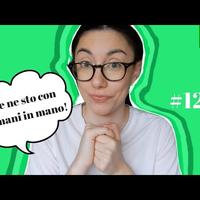ITALIAN IDIOMS #12: Starsene con le mani in mano
ITALIENISCHE IDIOMS #12: Untätig zusehen
ITALIAN IDIOMS #12: Standing idly by
IDIOMAS ITALIANOS #12: Quedarse de brazos cruzados
Ciao a tutti e bentornati sul mio canale!
Oi pessoal e bem-vindos de volta ao meu canal!
Nel video di oggi vorrei parlarvi dell'espressione idiomatica “starsene con le mani in mano”.
In today's video I'd like to talk to you about the idiom "sit with your hands in your hands".
No vídeo de hoje gostaria de falar com vocês sobre a expressão idiomática "starsene con le mani in mano".
Spiegare questo modo di dire ci dà anche l'opportunità di riflettere sul verbo pronominale
Explicar esse modo de dizer nos dá também a oportunidade de refletir sobre o verbo pronominal
“starsene”.
"Rester".
"starsene".
Quindi anche oggi possiamo parlare un po' di grammatica, non siete contenti?!
So even today we can talk a bit of grammar, aren't you happy ?!
Então, hoje também podemos falar um pouco de gramática. Não estão felizes?
A parte gli scherzi, questa espressione è molto utilizzata per dire che una persona
Seriously, this expression is widely used to say that a person
Deixando as brincadeiras de lado, essa expressão é muito usada para dizer que uma pessoa
non sta facendo nulla in una determinata situazione.
it is not doing anything in a given situation.
não está fazendo nada numa determinada situação.
Per esempio: ci sono tre amici, due amici stanno cucinando, mentre il terzo è seduto
Por exemplo: imagine dois amigos, dois amigos estão cozinhando, enquanto o terceiro está sentado
sul divano a guardare la tv, e quindi non è di grande aiuto.
on the sofa watching tv, so it doesn't really help.
no sofá assistindo TV, e logo não está ajudando muito.
Allora, uno dei due che cucina, potrebbe dire: “Invece di startene lì con le mani in mano,
Then, one of the two who cooks, might say: "Instead of standing there with our hands in hand,
Então, um dos dois que está cozinhando poderia dizer: "em vez de ficar aí com os braços cruzados,
vieni ad aiutarci!”.
come and help us! ”.
venha nos ajudar!".
Letteralmente, “starsene con le mani in mano” significa assumere questa posizione,
Literally, "to stay with your hands" means to assume this position,
Literalmente, "starsene con le mani in mano" significa assumir essa posição,
con le mani che si tengono l'un l'altra, e perciò non possono fare nient'altro.
with their hands holding each other, and therefore they cannot do anything else.
ficar com os braços cruzados, impedindo que eu faça algo.
Quindi se qualcuno non offre il suo aiuto o non fa nulla di utile, si può usare questa
Então se alguém não te oferece ajuda ou não faz nada de útil, é possível usar essa
espressione.
expressão.
Per parafrasare e spiegare meglio il suo significato, potremmo dire: “Invece di non fare nulla,
To paraphrase and better explain its meaning, we could say: "Instead of doing nothing,
Per parafrasear e explicar melhor o seu significado, podemos dizer: "Em vez de não fazer nada,
vieni ad aiutarci!”.
come and help us! ”.
venha nos ajudar!".
Quindi "starsene con le mani in mano" vuol dire "non fare nulla".
So "stay with your hands" means "do nothing".
Então "starsene con le mani in mano" quer dizer "não fazer nada".
Vediamo un momento il verbo che fa parte di questa espressione: starsene.
Let's see for a moment the verb that is part of this expression: stay.
Vejamos por um momento o verbo que fazer parte dessa expressão: starsene.
"Starsene" è un verbo pronominale perché all'interno troviamo due pronomi, un pronome
"Starsene" é um verbo pronomial porque dentro dele encontramos dois pronomes, um pronome
che funziona come riflessivo e “ne”.
que funciona como reflexivo e "ne".
Questi pronomi non hanno significato se tolti dal contesto del verbo.
Esses pronomes não têm um significado se forem retirados do contexto do verbo.
Perciò vanno coniugati insieme al verbo:
Por isso são conjugados junto ao verbo:
Io me ne sto Tu te ne stai
I stay You stay
"Io me ne sto", "Tu te ne stai"
Lui/Lei se ne sta Noi ce ne stiamo
"Lui/Lei se ne sta", "Noi ce ne stiamo"
Voi ve ne state Loro se ne stanno
"Voi ve ne state", "Loro se ne stanno"
Potremmo considerare il verbo pronominale “starsene” come la versione idiomatica
Podemos considerar o verbo pronomial "starsene" como a versão idiomática
e più colloquiale del verbo “stare”.
e mais coloquial do verbo "stare".
Potete trovare il modo di dire "starsene con le mani in mano" anche in una versione più
Vocês podem encontrar o modo de dizer "starsene con le mani in mano" também numa versão mais
semplice, quindi con il verbo “stare”, “stare con le mani in mano”.
simples, logo com o verbo "stare", "stare con le mani in mano".
Avete mai sentito questa espressione idiomatica?
Vocês já ouviram essa expressão idiomática?
Fatemi sapere nei commenti qui sotto!
Me avisem nos comentários aqui embaixo!
Grazie mille per aver guardato questo video e spero che vi sia utile.
Muito obrigado por terem assistido a esse vídeo e espero que ele os tenha sido útil.
Noi ci vediamo nel prossimo!
Nos vemos no próximo!
A presto, ciao!
Até mais, tchau!

